Remote.com is a leading Employer of Record (EOR) and global payroll platform. But is it the right choice for every business? As companies scale internationally, they’re often looking for more region-specific support, clearer pricing models, and faster onboarding—which is why Remote alternatives are gaining traction in 2025.
In this in-depth guide, we highlight the top 8 Remote competitors and alternatives, breaking down what makes each unique, where they shine, and how they stack up in pricing, features, and user reviews.
Table of Contents
- What Does Remote Offer?
- Why Should You Consider Remote Alternatives?
- What are the best Remote alternatives?
- Comparison Table
- Common Mistakes to Avoid When Switching from Remote
- How to Choose the Right Remote Alternative
- Why Choose Asanify Over Remote
- FAQs
What Does Remote Offer?
Remote.com is a prominent global employment platform that enables companies to hire both full-time employees and independent contractors across borders—without the need to establish a legal entity in each country. It is especially popular among startups and mid-sized businesses expanding internationally, thanks to its comprehensive Employer of Record (EOR) services and simplified HR workflows.
Remote offers the following core features:
- EOR services in 70+ countries with full legal infrastructure ownership
- Global payroll and tax compliance ensuring adherence to local regulations
- Contractor payments and management, supporting hybrid workforce models
- Benefits, equity, and IP protection tools to secure employee rights and business interests
- An intuitive dashboard to manage onboarding, payroll, leave tracking, and documentation
While Remote has earned a strong reputation for its clean interface and global reach, some users have expressed concerns over higher-than-expected pricing, slower customer support, and occasional hidden charges—particularly in complex or emerging markets. These issues have led many companies to explore Remote.com alternatives that offer greater flexibility, faster onboarding, or better value for money.
Why Should You Consider Remote Alternatives?
While Remote.com offers an extensive global infrastructure and a user-friendly platform, it may not be the perfect fit for every organization. Based on real user feedback—particularly from Reddit and SaaS review forums—several recurring pain points have emerged that prompt companies to explore more flexible or cost-effective solutions.
Reddit Reveals: Common Complaints About Remote
- Slower Onboarding in APAC and LATAM regions
Users report that onboarding timelines in Asia and Latin America can be delayed due to Remote’s limited operational depth in emerging markets. - Limited In-Country Support for legal & HR issues
Although Remote owns its legal entities, it often lacks dedicated in-country HR advisors, making it harder to resolve region-specific compliance or labor law concerns. - Feature Gating — Essential tools like IP protection or visa support come at extra cost
Key features such as intellectual property protection, equity plans, and immigration assistance are not always included in base pricing, leading to unexpected upsells. - UI/UX Limitations — Clean interface but lacking in customization
While Remote’s dashboard is sleek and intuitive, it doesn’t always allow for custom workflows or document templates that some teams require. - Pricing Complexity — Add-ons drive up total cost of ownership
Although Remote advertises flat-rate pricing, many users have encountered additional fees for features, integrations, or region-specific services—making budgeting unpredictable.
If these concerns resonate with your experience, it might be time to evaluate Remote.com alternatives that better align with your business size, budget, or regional hiring goals.
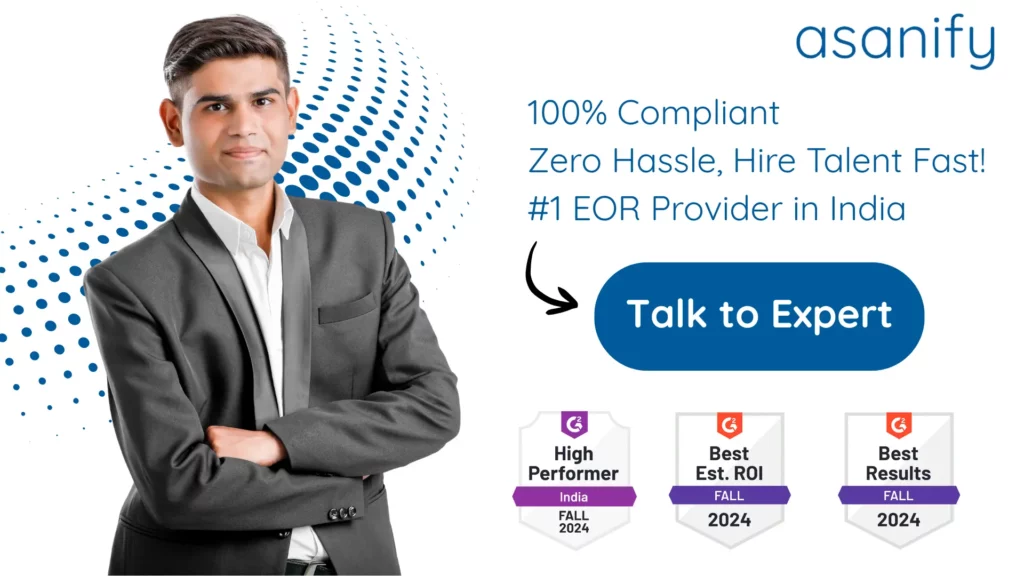
What are the best Remote alternatives?
Here are the top alternatives to Remote we’ve identified through our research and experience. Each offers distinct advantages for managing global teams, making them strong options to consider if you’re seeking better onboarding speed, transparent pricing, or stronger in-country support than Remote.
Top 8 Remote Competitors & Alternatives in 2025:
1. Asanify
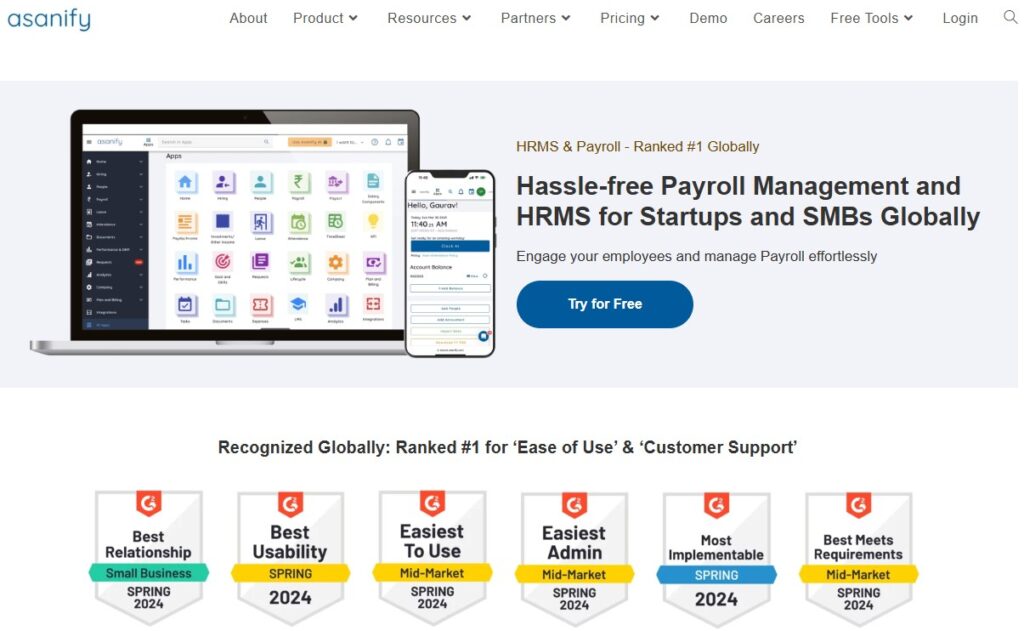
Asanify enables fast and compliant hiring in India, the UAE, Singapore, and the Philippines with transparent pricing, payroll automation, and in-country HR support.
A trusted Employer of Record (EOR) platform specializing in emerging APAC markets. It allows international businesses to legally hire full-time employees in India and nearby regions without setting up local entities. With end-to-end HR management, fast onboarding, and visa sponsorship support, Asanify has become a popular choice for global companies expanding in Asia.
Key Features of Asanify:
- Localized EOR services in India, UAE, Singapore, and the Philippines
- 5–7 business day onboarding and contract processing
- Full payroll processing with compliance for PF, ESI, and TDS
- Dedicated local HR partners and account managers
- Contractor onboarding and multi-currency payments
- Visa and immigration support
- Transparent, flat-fee billing with no hidden charges
Pricing Structure of Asanify:
- EOR Services: $299–399 per employee/month
- Contractor Management: $29–49 per contractor/month
- Visa Support: Custom pricing
- No setup or implementation fees
Asanify’s Pros & Cons
| Pros | Cons |
| Fastest onboarding in India/APAC | Limited global presence (no EU or LATAM) |
| Transparent and competitive pricing | Smaller integration marketplace |
| Visa, benefits, and compliance handled locally | No global stock/equity tools |
| Local HR & tax support in-country | Not suited for large-scale EU expansion |
G2 Rating: 4.8/5
Asanify is an excellent Remote alternative for companies hiring in India and APAC regions, offering full compliance, advisory, and fast onboarding at competitive rates.
2. Deel
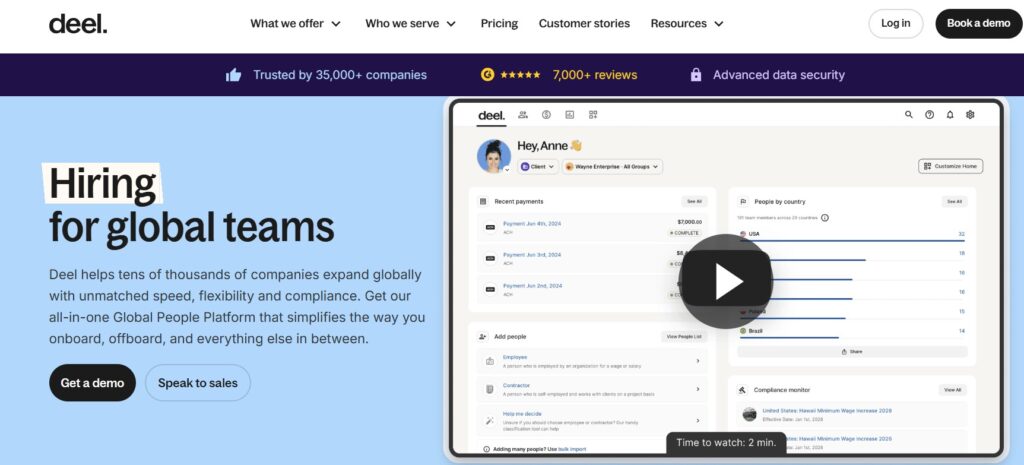
Deel helps businesses hire employees or contractors in over 100 countries with built-in compliance and global payroll support.
It is one of the most well-known global EOR platforms, providing localized contracts, equity management, and automated workflows. The platform is especially strong for teams looking for compliance visibility and integrations with HR and accounting tools.
Key Features of Deel:
- EOR and contractor support in 100+ countries
- Global equity and stock option plan management
- Automated invoicing and one-click payment processing
- Built-in IP protection and tax compliance
- Dashboard with full HR workflow visibility
- Integrations with QuickBooks, BambooHR, and Netsuite
Pricing Structure of Deel:
- EOR Services: Starts at $599 per employee/month
- Contractor Management: $49 per contractor/month
- Add-ons (IP protection, equity, benefits): Additional cost
Deel’s Pros & Cons
| Pros | Cons |
| Wide global coverage | Pricing increases quickly with add-ons |
| Clean UI and automated workflows | Support may be slow at scale |
| Excellent HR and accounting integrations | No dedicated in-country HR partners |
| Supports equity, benefits, and IP protection | Costlier than regional EORs |
G2 Rating: 4.7/5
Deel remains a strong Remote alternative for companies needing global scale and integrations, though pricing is steeper and support less hands-on than localized providers.
3. Rippling
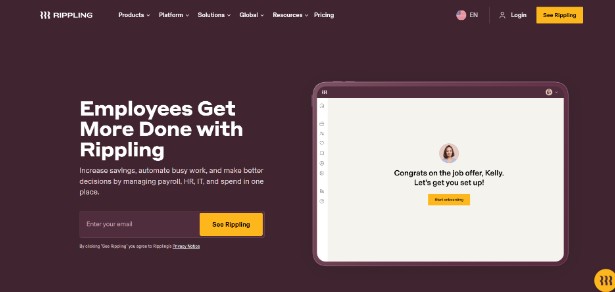
Rippling helps companies manage payroll, IT, HR, and global teams on one unified platform.
It stands out by offering a modular platform that connects EOR with IT provisioning and expense management. Its unified architecture makes it ideal for U.S.-based companies managing both remote and hybrid teams worldwide.
Key Features of Rippling:
- Modular global EOR and payroll in 50+ countries
- HRIS with centralized employee records and compliance
- Remote IT device management and access controls
- App provisioning, security, and expense management
- Automation tools for onboarding and offboarding
- Extensive integration ecosystem (600+ apps)
Pricing Structure of Rippling:
- EOR Services: $500–600 per employee/month
- Contractor Management: $29 per contractor/month
- Platform base fee: Starts at $8 per user/month
Rippling’s Pros & Cons
| Pros | Cons |
| HR, IT, and payroll in one system | Not purpose-built as a global-first EOR |
| Deep integration stack | Pricing lacks upfront transparency |
| Excellent automation for onboarding | Learning curve for new users |
| Ideal for hybrid and IT-heavy orgs | Regional compliance less tailored than others |
G2 Rating: 4.6/5
Rippling is a great Remote alternative if you want centralized IT + HR controls, though not as tailored for fast hiring in emerging global markets.
4. Velocity Global
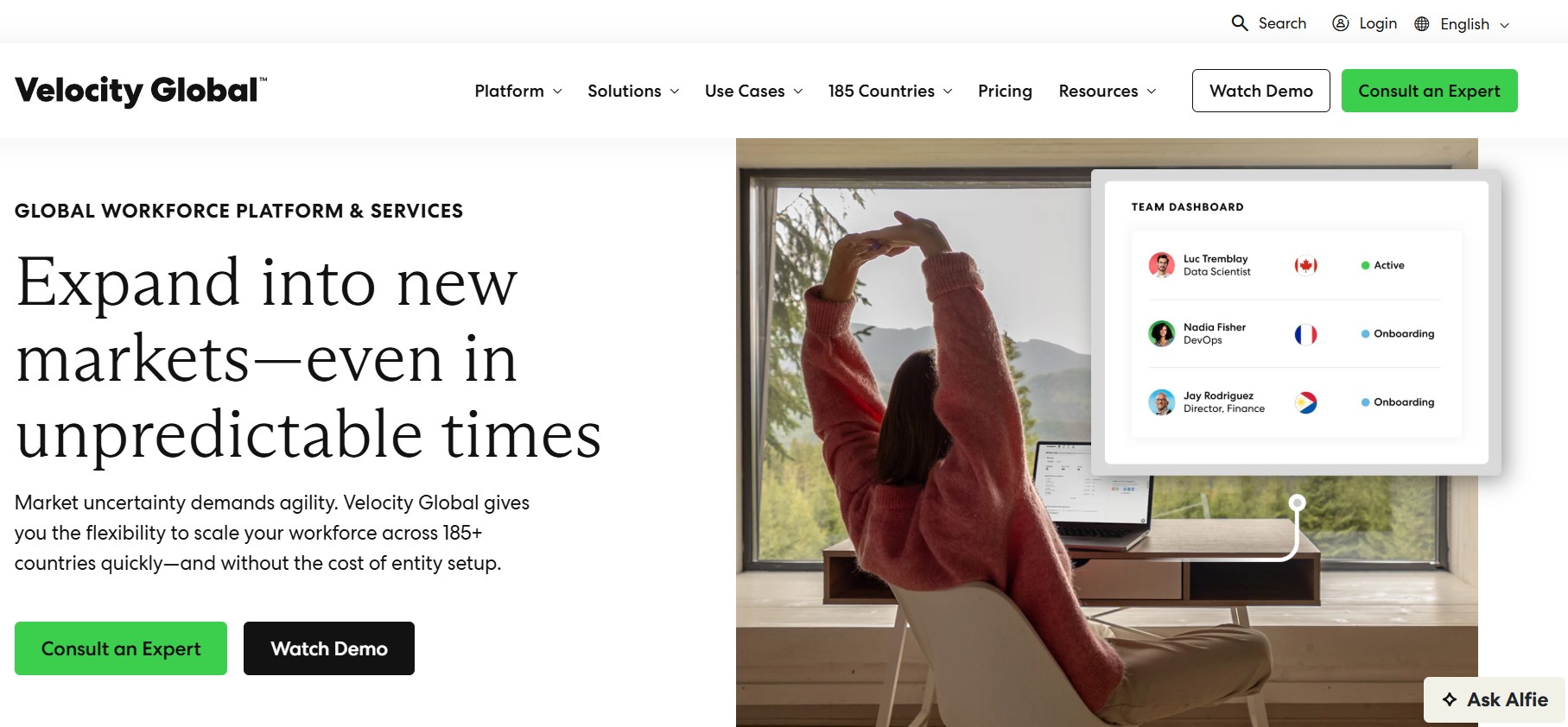
Velocity Global enables companies to hire international employees across 185+ countries with full compliance and advisory.
It is a well-established global employment solution that supports fast growth, enterprise-scale compliance, and white-glove onboarding. With its Global Work Platform™, it provides strategic workforce management beyond just payroll.
Key Features of Velocity Global:
- Owned legal entities in 50+ countries
- In-country HR and legal advisory teams
- Global mobility, visa, and immigration assistance
- Benefits and retirement plan customization
- Localized contract templates and compliance support
- Global Work Platform™ dashboard for tracking
Pricing Structure of Velocity Global:
- EOR Services: Custom pricing (typically $600–800 per employee/month)
- No public contractor plan
- Setup, offboarding, or local tax services: May incur additional fees
Velocity Global’s Pros & Cons
| Pros | Cons |
| In-country HR advisors and visa support | Expensive for startups and small teams |
| Owned legal entities in multiple countries | Pricing not publicly available |
| Full lifecycle HR management | Slower implementation vs newer platforms |
| Strategic support for global scaling | No standalone contractor management |
G2 Rating: 4.5/5
Velocity Global is ideal for enterprises replacing Remote with more personalized, compliant global hiring, though pricing may be steep for smaller firms.

5. Papaya Global
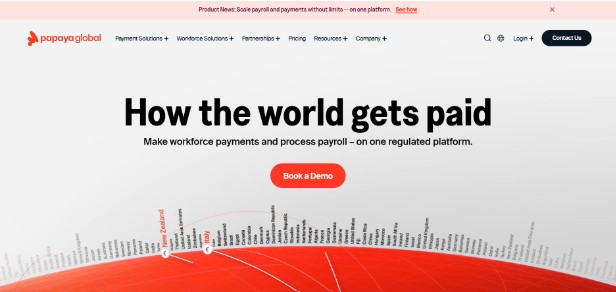
Papaya Global streamlines multi-country payroll and EOR with an AI-powered platform and smart payment infrastructure.
It offers a regulated global payroll platform that supports EOR and payroll in over 160 countries. Its platform is designed for analytics-heavy teams needing detailed workforce cost tracking.
Key Features of Papaya Global:
- AI-driven payroll across 160+ countries
- Virtual wallet with multi-currency capabilities
- Workforce analytics and performance dashboards
- Country-specific compliance engine
- Integrated benefits and global health insurance
- Employee self-service mobile app
Pricing Structure of Papaya Global:
- EOR Services: $599–650 per employee/month
- Contractor Management: $30 per contractor/month
- Payroll+ Add-ons: $15–25 per employee/month
- Global payments: From $2.50/transaction
Papaya Global’s Pros & Cons
| Pros | Cons |
| AI-powered automation and analytics | Higher cost than most alternatives |
| Mobile app for employee access | 12-month notice period in some contracts |
| Extensive payroll and compliance engine | Implementation can be complex |
| Covers 160+ countries | Some fees not clearly disclosed upfront |
G2 Rating: 4.2/5
Papaya Global is ideal for teams replacing Remote with deeper analytics and payroll intelligence—especially finance-driven organizations.
6. Oyster HR
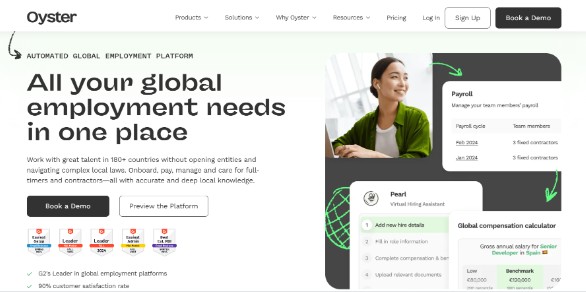
Oyster enables global hiring, payroll, and compliance for full-time and contract workers in 180+ countries with a remote-first approach.
It is a mission-driven global employment platform with a focus on transparency, equity, and distributed workforces. It’s great for startups and remote-native teams looking for localized benefits and contract templates.
Key Features of Oyster HR:
- Automated EOR across 180+ countries
- Quick contractor onboarding and invoice payments
- Time-off and leave tracking
- Document and contract storage
- Localized benefits package builder
- Built-in payroll and compliance workflows
Pricing Structure of Oyster HR:
- EOR Services: $599–699 per employee/month
- Contractor Management: $29 per contractor/month
- Payroll: $25 per employee/month
- Refundable security deposit required
Oyster HR’s Pros & Cons
| Pros | Cons |
| Competitive contractor pricing | Requires refundable deposit upfront |
| Local benefits and equity tools | No phone support or live advisory |
| User-friendly and transparent UI | Third-party vendor reliance in some markets |
| Covers 180+ countries | Reported payment delays in some regions |
G2 Rating: 4.4/5
Oyster HR is best for remote-first teams looking to replace Remote with a flexible, values-aligned hiring platform—but support access may be limited.
7. Multiplier
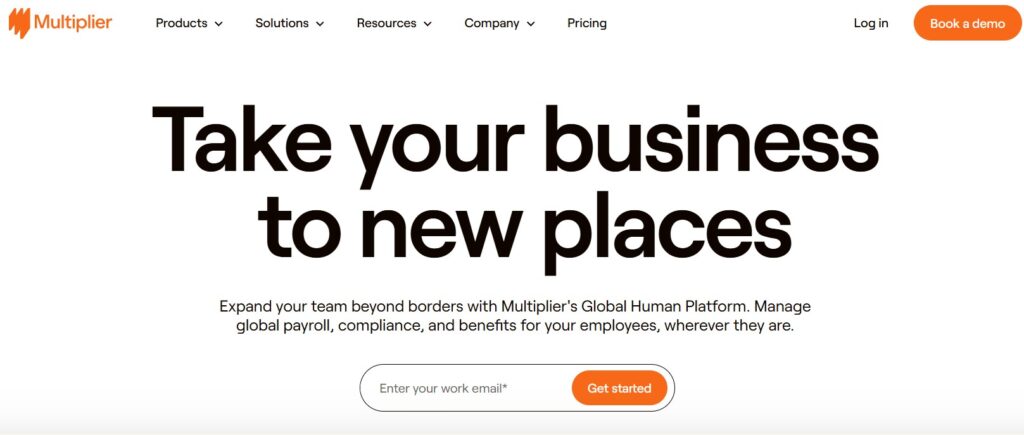
Multiplier offers compliant hiring, payroll, and benefits administration in over 150 countries with fast onboarding and competitive pricing.
Founded in 2020, Multiplier quickly gained traction as a flexible global employment platform with support for crypto payments, ESOPs, and local benefits.
Key Features of Multiplier:
- 150-country EOR coverage with 72-hour onboarding
- Local payroll, benefits, and contractor compliance
- Crypto and multi-currency salary payments
- ESOP and benefits management
- Instant compliant contract creation
- Custom reporting and analytics
Pricing Structure of Multiplier:
- EOR Services: $400 per employee/month
- Contractor Management: $40 per contractor/month
- Payroll: Custom pricing
- No implementation or setup fees
Multiplier’s Pros & Cons
| Pros | Cons |
| Quickest onboarding and contracts | Only weekday (24/5) support available |
| Crypto and multi-currency payroll | No mobile app |
| User-friendly and fast to adopt | Limited deep HRIS features |
| Competitive pricing | Inconsistent service reviews |
G2 Rating: 4.7/5
Multiplier is a smart Remote alternative for companies prioritizing speed, pricing, and digital-native capabilities.
8. Globalization Partners (G-P)
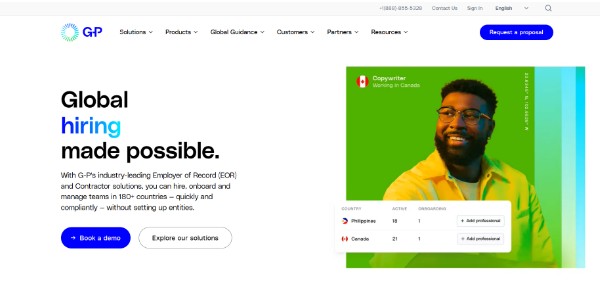
G-P helps businesses scale globally with full EOR coverage, legal infrastructure, and strategic support in 180+ countries.
G-P is one of the original EOR pioneers, offering robust enterprise features, owned entities, and trusted in-country HR services. It’s ideal for large businesses replacing Remote with more full-service support.
Key Features of Globalization Partners:
- Global employment and onboarding in 180+ countries
- Owned legal entities and tax infrastructure
- Full benefits administration and compliance
- Work visa and immigration services
- API integrations with major HR systems
- GDPR, SOC2, ISO-certified platform
Pricing Structure of Globalization Partners:
- EOR: 15% of employee salary (min. $1,500/month)
- Setup, offboarding, wiring fees may apply
- No contractor management available
Globalization Partners’ Pros & Cons
| Pros | Cons |
| Deep compliance and legal expertise | Most expensive Remote alternative |
| Owned entities in most regions | Complex pricing structure |
| Trusted brand for enterprise expansion | No support for contractor hiring |
| End-to-end service from onboarding to exit | Slower implementation timeline |
G2 Rating: 4.6/5
Globalization Partners is best for replacing Remote in complex, enterprise-scale hiring environments—if budget and timeline are less of a concern.
Comparison Table
| Provider | G2 Rating | EOR Starting Price | Strength | Best For |
| Asanify | 4.8 | $299/month | India & APAC | Startups in emerging markets |
| Deel | 4.7 | $599/month | Global coverage | Compliance-heavy companies |
| Rippling | 4.6 | Modular | US-based HR + IT | Hybrid HR-IT setups |
| Multiplier | 4.7 | $300–$400/month | Asia, Middle East | Cost-conscious global hiring |
| Oyster HR | 4.4 | $499/month | Remote-first teams | Distributed workforces |
| Papaya Global | 4.2 | $650+/month | Global payroll analytics | Enterprises, financial orgs |
| Skuad | 4.5 | $399/month | Africa, LATAM | Hiring in emerging economies |
| G-P | 4.6 | Quote-based | Enterprise EOR scale | Fortune 1000, multinational orgs |
Common Mistakes to Avoid When Switching from Remote
Choosing a global EOR or payroll partner is a strategic decision—especially when replacing an established platform like Remote. Here are common pitfalls that can derail your global hiring goals:
1. Overlooking Regional Support
Many EOR platforms advertise global coverage, but that doesn’t always mean they offer deep, in-country expertise. In compliance-heavy markets like India, the UAE, and parts of Southeast Asia, a lack of localized HR support can result in legal missteps, tax complications, and subpar employee experiences. Always verify the depth—not just the breadth—of regional capabilities.
2. Assuming Flat Pricing Covers Everything
Some providers, including Remote, may promote flat monthly rates that appear inclusive but often exclude key services such as benefits administration, IP protection, equity plan management, or visa sponsorship. This leads to unexpected costs that can significantly impact your budget. Be sure to clarify what is—and isn’t—covered in the base plan.
3. Failing to Confirm Onboarding Timelines
Fast hiring cycles require fast onboarding. Platforms that rely on third-party partners or lack local infrastructure can take weeks to onboard a new employee. Always ask about average onboarding timelines per country, including documentation, benefits setup, and first payroll processing.
4. Choosing Based on UI Instead of Service Depth
A sleek dashboard is great—but it’s not a substitute for legal accuracy, real-time HR support, or scalable payroll operations. Many companies regret prioritizing aesthetics over functionality, especially when facing region-specific challenges like tax audits or immigration paperwork.
5. Neglecting Post-Onboarding Support
Support doesn’t end after onboarding. Whether it’s resolving benefits queries, updating salary structures, or handling terminations compliantly, ongoing support is critical. Make sure the platform you choose offers responsive customer success teams—not just automated ticketing systems.
How to Choose the Right Remote Alternative
If you’re transitioning away from Remote, it’s essential to align your next platform with your long-term growth, budget, and operational needs. Here’s a decision checklist to guide you:
1. Where Are You Hiring?
Consider the countries where you plan to expand. Look for platforms with deep in-country legal, payroll, and HR expertise—not just general coverage claims. For example, platforms like Asanify specialize in India and Southeast Asia, offering unbeatable regional depth.
2. Do You Need EOR, Contractor Management, or Both?
Some platforms excel in full-time employee (EOR) onboarding, while others are better suited for managing international freelancers and contractors. If your workforce is hybrid or remote-first, look for a provider that supports both models seamlessly.
3. What’s Your Budget Tolerance?
Pricing varies widely across platforms. Providers like Papaya Global and Velocity Global offer enterprise-grade services at a premium, while alternatives like Asanify and Multiplier provide flat-fee models suited for startups and fast-scaling teams. Choose a plan that balances affordability with service quality.
4. Do You Prefer Hands-On Advisory or a Self-Service Platform?
Some companies want control via dashboards and automations; others prefer a dedicated HR partner for legal guidance, benefits design, and issue resolution. Clarify your expectations before committing—platforms like Asanify offer personalized, local support at no extra cost.
5. What Support Channels Are Available?
Will you have access to live HR advisors or only chatbots? Do they operate in your time zones? Support responsiveness can make or break your experience—especially when onboarding employees or resolving compliance queries across borders.

Why Choose Asanify Over Remote
If you’re planning to scale across India, Southeast Asia, or the Middle East, Asanify is purpose-built to support your expansion—with region-specific compliance, faster onboarding, and a cost-effective pricing model that makes global hiring accessible for startups and enterprises alike.
Here’s why Asanify is the ideal Remote alternative:
- Fastest EOR Onboarding in APAC: Most employees go live within 5–7 business days, including contract generation, KYC, and payroll registration—significantly faster than Remote in high-compliance markets.
- Transparent Flat-Fee Pricing: No setup fees, no legal retainers, and no hidden costs. With Asanify, what you see is what you pay.
- Visa & Immigration Services: Unlike Remote, Asanify provides end-to-end assistance for work visas and relocation, ensuring your international hires remain compliant and supported.
- Contractor & Full-Time Hiring: Whether you’re managing gig workers or onboarding salaried employees, Asanify supports both models with localized agreements and multi-currency payouts.
- In-Country HR and Legal Advisory: You’ll work with dedicated HR business partners who understand the nuances of local labor laws, taxes, and statutory benefits—no generic chatbot support or ticket queues.
- Localized Benefits Administration: Asanify helps set up PF, ESI, gratuity, insurance, and allowances tailored to local expectations—ensuring your hires feel valued and secure.
Asanify combines speed, affordability, and regional depth, making it the most reliable Remote alternative for businesses focused on India, Singapore, the UAE, and the Philippines.
FAQs
Asanify is purpose-built for APAC, offering compliance, onboarding, and payroll under one roof.
Asanify and G-P both offer dedicated account managers, while Deel has support tiers based on plan.
Yes. Deel and Remote are often 40–50% more expensive than leaner providers like Asanify or Multiplier.
Yes. Asanify, Skuad, and Papaya all support migration onboarding with contract continuity.
Asanify and Multiplier offer some of the lowest transparent EOR pricing starting at ~$299/month.
Not to be considered as tax, legal, financial or HR advice. Regulations change over time so please consult a lawyer, accountant or Labour Law expert for specific guidance.



